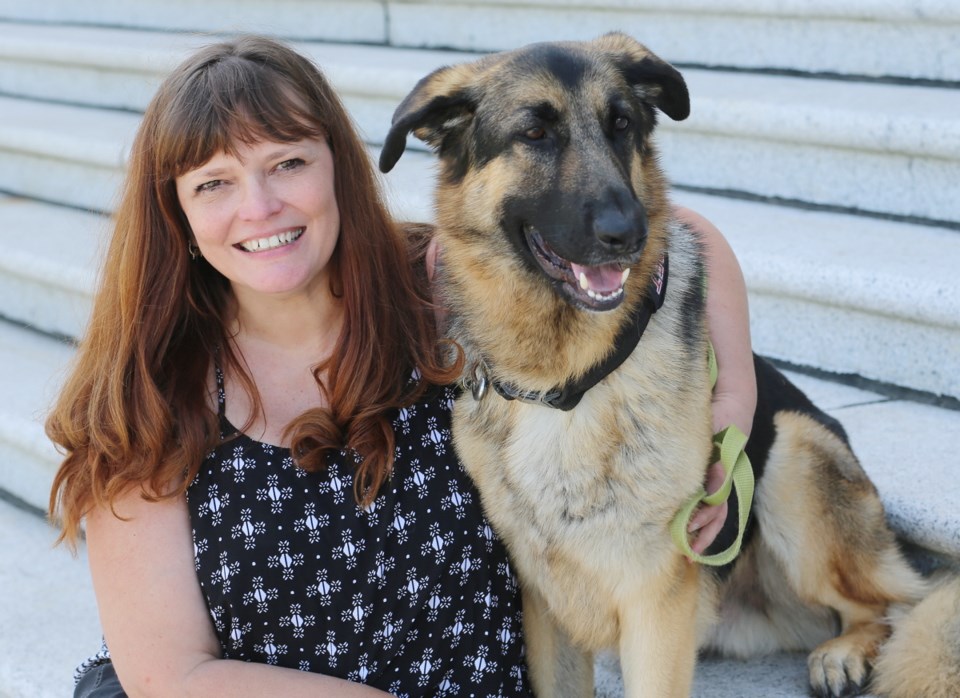The 2011 stabbing of Victoria police Const. Lane Douglas-Hunt dominated headlines as the case wound its way through the court system.
But the story that hasn’t been told is that of the police dispatcher who sent the 25-year-old officer to what came in as a routine shoplifting call at a downtown 7-Eleven on Jan. 17, 2011.
Tania McClelland said she blames herself for sending Douglas-Hunt into danger, and is on sick leave from the Victoria Police Department as a result of post-traumatic stress disorder.
Douglas-Hunt’s neck and ear were injured in the knife attack. Her left hand was badly cut and her thumb almost severed.
[Scroll down to see surveillance video of the attack]
“I will always feel guilty,” said McClelland, 48. “I sent her into that call alone. If I didn’t send her to that call, it never would have happened.”
McClelland shared her emotional story with Jobs Minister Shirley Bond last week, part of a meeting with first responders who are pushing for improvements in the way WorkSafe B.C. deals with mental-health injury claims.
“At the end of the meeting, she bent down to talk to me and she had genuine tears,” McClelland said. “I saw the empathy in her.”
Bond was not available for an interview, but released a statement. “I will continue to look for improvements that can be made to the current system of supports for injured workers to ensure they receive appropriate care,” Bond said. “I am always concerned about injured workers and I appreciated having a chance to hear from the delegation.
“I recognize how hard it was for them to share their personal stories and the courage it takes to come forward.”
McClelland and the group of paramedics, firefighters and police officers who attended the meeting are asking for psychological supports to kick in as soon as a mental-health claim is filed with WorkSafe B.C.
“That’s where I fell through the cracks,” McClelland said.
McClelland’s injury claim to WorkSafe B.C. was initially denied, then accepted after a review. She said her request for a certified service dog to assist with her PTSD was denied and it took nine months for funding to be approved so McClelland could attend group therapy.
“It’s been a battle since Day 1,” she said.
Jennifer Leyen, WorkSafe B.C.’s director of special care services and disability awards, said she understands McClelland’s frustration. “I do see there was a delay between January 2013 [when group therapy was requested] and September 2013 when she actually got into the program,” said Leyen, who was authorized to speak directly about the compensation claim because McClelland gave permission. “It did take a long time and I will acknowledge that.”
McClelland’s request for a certified service dog was turned down because “right now there isn’t the clinical or the medical evidence that this is a therapeutic intervention, that having a service dog helps people get better,” Leyen said. WorkSafe B.C. is looking closely at a Veterans Affairs Canada pilot project looking at whether service dogs assist those with PTSD.
Leyen said services for workers with mental-health injuries have improved since McClelland filed her claim. In 2012, legislation was passed to legally recognize diagnosed work-related mental disorders. WorkSafe B.C. created a specialized mental-health claims unit, with specially trained staff who consult with psychologists, mental-health specialists, physicians and nurses with community mental-health expertise, to manage PTSD claims.
“Now we have a much more extensive range of programs for PTSD clients,” Leyen said. “We have much more awareness of the kinds of treatment that these patients need.”
McClelland relies on the group meetings and the companionship of her German shepherd, Jack, who is not a certified service dog.
After McClelland’s claim was denied in 2011, she went back to work in the Victoria police communications centre for 15 months, but realized she was still suffering emotionally.
“I started collapsing, but I had to keep going because I had two kids at home, bills to pay,” she said.
“The kids suffered the worst through the whole thing. They didn’t have a mom. I wasn’t cooking, wasn’t cleaning, I was taking prescribed pain killers to numb the pain.”
McClelland had suicidal thoughts and in June 2012 stopped working. In January 2013, she tried to take an online training course to be a court reporter but she had trouble concentrating. She is now focusing on her recovery through group and one-on-one counselling.
The first responders are also pushing for B.C. to follow Alberta’s lead and implement “presumptive” disability legislation for mental-health injuries in first responders, recognizing the disorder as a work-related hazard. That would make it easier for paramedics, police officers and firefighters suffering from PTSD to get compensation from WorkSafe B.C.
At the meeting with Bond, Lisa Jennings — a Victoria paramedic who went public with her experience with PTSD and has since launched an online support group for first responders called You Are Not Alone — handed over a stack of support letters from police associations, firefighter associations and city councils from across the province.
“I think we made progress,” said Jennings, who has twice had her compensation claim denied by WorkSafe B.C. She is now bringing the case to a tribunal.
NDP MLAs Maurine Karagianis, Judy Darcy and Shane Simpson had a meeting with Jennings and other first responders in February and are backing their cause.
On Monday, Manitoba introduced presumptive disability legislation for PTSD. Ontario and New Brunswick are set to follow suit.
McClelland said she regrets telling her employer about her struggle with PTSD, which resulted in the battle with WorkSafe B.C.
“I wish I had never come forward, it’s made it worse,” she said, a sign that the supports for workers with mental-health injuries are not yet there.
“All I know is that things have to change.”



